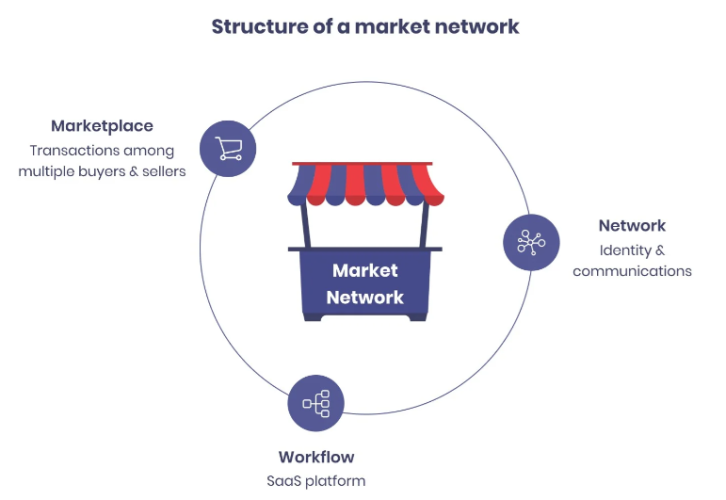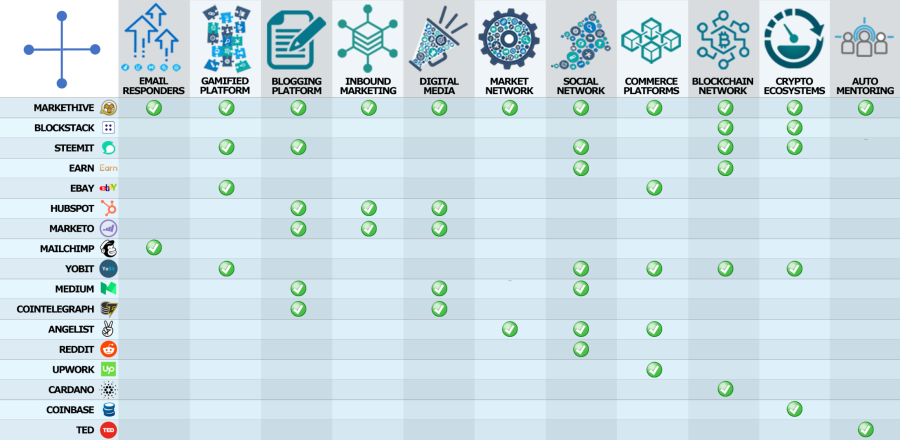
MARKETHIVE The Ultimate Market Network. A Market Network Comparison
.png)
Markethive is revolutionary and can be regarded as the ultimate market network, a comprehensive digital ecosystem designed to empower entrepreneurs, marketers, and individuals to forge meaningful connections and generate sustainable income. This vision indicates a platform that goes beyond the constraints of traditional social media channels, narrowly focused marketing services, and market networks, intending to integrate a wide range of functionalities into a cohesive and synergistic environment.
To thoroughly assess its comprehensiveness, this article offers a comparative analysis of both established and emerging platforms in the market network landscape. This framework enables a detailed evaluation of Markethive's positioning within the broader market, emphasizing its unique characteristics compared to other market networks.
What Are Market Networks?
Market networks represent a new generation of online platforms that strategically combine the transactional efficiency of marketplaces with the community-building and engagement features of social networks, along with the productivity enhancements of SaaS tools. Moving beyond the fundamental exchange of goods or services that characterize conventional marketplaces, these platforms are designed to facilitate complex, multifaceted projects and iterative processes that often require collaboration, shared expertise, and ongoing communication among participants.
The core philosophy of market networks focuses on building enduring, trust-based relationships among buyers, sellers, and stakeholders within a specific industry or niche, rather than merely facilitating one-off transactions. This focus on nurturing connections and supporting profound interactions sets market networks apart from their purely transactional forerunners, ultimately unlocking opportunities for enhanced value creation and innovation. It encompasses the creation of an ecosystem where professionals can build reputations, nurture relationships, and collectively deliver sophisticated solutions.

Image source: Codica.com
Key Attributes of Market Networks
Market networks, distinct from traditional marketplaces and social networks, exhibit the following characteristics:
Integrated Functionality: They blend features of:
- Marketplaces: Offering tools for discovering and engaging service providers.
- Social Networks: Providing user profiles to showcase expertise and cultivate connections.
- SaaS Platforms: Incorporating workflow management tools suitable for extended projects.
Emphasis on Complex Engagements:
- These networks are structured to support intricate, ongoing projects demanding significant collaboration and specialized skills.
Identity and Connection Building:
- Users develop comprehensive profiles emphasizing their unique abilities and achievements, promoting enduring relationships and trust.
Diverse Revenue Streams:
- Market networks leverage social networks' strong network effects and growth potential alongside the profitable models of SaaS and marketplace businesses.
Enhanced Value through Participation:
- The platform's utility grows with each new user, establishing a cycle where increased participation attracts further members.
Key Examples of Market Networks In Specific Industries
Houzz connects homeowners with home improvement professionals and products. It offers a comprehensive platform for planning and executing home renovation projects.
Key Features: Profiles for professionals, project management tools, product listings, and a community for sharing ideas and inspiration.
Doximity is a market network for healthcare professionals, providing a platform for communication, collaboration, and finding job opportunities. It has become a trusted platform for healthcare professionals.
Key Features: Secure messaging, job listings, and a professional network for healthcare providers.
Legal.io connects legal professionals with clients and provides tools for managing legal projects and workflows. It has been recognized for its innovative approach to legal services and ability to streamline the legal process.
Key Features: Profiles for lawyers, project management tools, and a platform for finding and managing legal services.
Joist is a market network for residential construction, connecting homeowners with builders and other construction professionals. Joist has been recognized for its ability to streamline the construction process and improve communication between homeowners and builders.
Key Features: Project management tools, profiles for professionals, and a platform for managing construction projects.

Image Source: Markethive.com
Markethive: A Market Network With A Difference
Markethive is categorized as a Market Network and represents a more encompassing and intricate ecosystem designed to empower entrepreneurs and businesses across various industries. Markethive's use of blockchain technology sets it apart from other market network platforms. It provides a decentralized, autonomous environment that ensures security and privacy for users.
This innovative platform converges the core functionalities of leading online services like LinkedIn for professional networking and career development, Facebook for social connection and community building, Amazon for e-commerce capabilities and a robust marketplace, and Marketo for advanced marketing automation and lead management. It is a multifaceted platform integrating social networking capabilities with advanced marketing tools, digital media broadcasting capabilities, cryptocurrency and exchange functionalities, and a cooperative economic model.
Users can build and nurture professional networks, engage in social interactions, discover and transact goods and services through a built-in marketplace, and leverage sophisticated marketing tools to reach target audiences and drive business growth. This synergy creates a unique environment where members can connect, collaborate, build communities, generate leads, conduct sophisticated marketing campaigns, and participate in a decentralized financial system through its native cryptocurrency, Hivecoin (HVC).
Key Features:
Markethive offers a comprehensive suite of tools for entrepreneurs, integrating social networking, marketing automation, a unique economic model, including creating community stakeholders through ILPs, blockchain technology, and commerce platforms.
- Social Networking: Build custom groups, storefronts, personalized profile pages, and multiple dedicated newsfeeds.
- Marketing Automation: Access a full suite of inbound marketing tools, including CRM, CMS, autoresponders, blogging and broadcasting capabilities, and integrated landing pages.
- Financial Hub: Comprehensive wallet and accounting system to keep track of all financial activity and income.
- Economic Model: Earn Hivecoin, which is deposited into your Markethive wallet for active engagement and contributions.
- Blockchain Integration: Benefit from secure and transparent transactions and data management.
- Commerce Platforms: Utilize cryptocurrency transactions across various services through Markethive's integration with multiple commerce platforms.
Comparison with Market Networks Similar To Markethive
AngelList is a market network that connects angel investors with startups and job seekers with tech companies. It was launched in 2010 with the core mission of assisting startups in fundraising and talent acquisition.
Similarities with Markethive:
- Both Markethive and AngelList function as platforms connecting distinct groups to enable transactions and partnerships.
- Both provide resources and tools aimed at fostering the growth and success of startups.
Differences from Markethive:
- Blockchain Technology: A key differentiator is Markethive's utilization of blockchain technology to ensure secure and transparent transactions, a feature absent in AngelList.
- Inbound Marketing Tools: Markethive provides a comprehensive suite of inbound marketing tools, whereas AngelList focuses more on fundraising and job placement.
- Social and Collaborative Environment: Markethive fosters a more social and collaborative environment, while AngelList is more transactional and focused on specific connections.
Upwork is a prominent online marketplace designed to facilitate connections between businesses seeking specific skills and freelance professionals offering expertise across diverse fields. These fields include writing and translation, graphic design and multimedia, software development and IT support, and digital marketing and social media management.
Similarities with Markethive:
- Both Upwork and Markethive function as platforms enabling transactional relationships between individuals or entities providing services, creating a marketplace for talent and opportunities.
- Both platforms offer a suite of tools and features to streamline and optimize these transactions.
Differences from Markethive:
- Technology: Markethive utilizes blockchain for secure and transparent transactions and potentially lower fees than Upwork's traditional payment methods. Upwork relies on direct bank transfers, wire transfers, and third-party payment processors.
- Marketing Focus: Markethive offers a wide array of complimentary inbound marketing tools. Upwork primarily focuses on project management and its fee structure.
- Community Aspect: Markethive emphasizes a social and collaborative community, whereas Upwork is more transactional and centered around project delivery.
Markethive is designed to be a comprehensive ecosystem for freelancers, offering marketing, networking, and collaboration tools. It emphasizes community building and provides a space for freelancers to showcase their services and connect with potential clients. Markethive creates a supportive environment where freelancers can grow their businesses and network with other professionals.
HoneyBook is a market network for event planners, photographers, freelancers, and creative professionals who need a comprehensive client management and project management solution. It provides tools for managing client relationships, contracts, and payments.
Similarities with Markethive:
- Both Honeybook and Markethive provide tools for managing client interactions, workflow, and automation features to improve efficiency and reduce manual work.
- Both platforms allow users to customize templates, offer customizable client portals to facilitate better client engagement and transparency, and lead tracking and management.
Differences from Markethive:
- Technology: Markethive utilizes blockchain and cryptocurrency for secure, transparent transactions and potentially lower fees than Honeybook’s traditional payment and billing methods.
- Marketing Focus: Markethive emphasizes social media and affiliate marketing, lead generation, community building, and e-commerce, whereas Honeybook is more about client management, project management, invoicing, and payment processing.
- Integration and Ecosystem: HoneyBook integrates well with other business tools, such as QuickBooks for accounting and various payment processors. Markethive has a more integrated ecosystem, including its own social network, e-commerce platform, and marketing tools, which can appeal to businesses looking for a one-stop solution.

Image Source: Markethive.com
The Definitive Market Network, Envisioned As A Leading Entity
Markethive distinguishes itself from other market network platforms through its comprehensive and interconnected ecosystem of services, designed to cultivate user growth, autonomy, and shared success. Unlike platforms that may focus on singular aspects of online interaction or transaction, Markethive offers a holistic infrastructure that addresses the multifaceted needs of individuals and organizations operating in the digital landscape.
This interconnected suite of services aims to redefine how users connect, engage, and conduct business online. Markethive provides a robust foundation that supports the entire entrepreneurial lifecycle, beginning with establishing meaningful connections and fostering active engagement among its members. This initial stage is crucial for building relationships, exchanging ideas, and identifying potential collaborations.
Beyond mere connection, Markethive provides tools and resources to facilitate sustained marketing success. This includes a range of features designed to empower users to effectively promote their products, services, and ideas to a targeted audience within the network. The platform's integrated marketing capabilities aim to streamline the promotional process and enhance the visibility of its members.
Furthermore, Markethive places a strong emphasis on financial empowerment. The platform incorporates mechanisms that enable users to generate value and participate in the economic activity of the network. This focus on financial incentives and opportunities for wealth creation distinguishes Markethive as more than just a social or professional networking platform; it strives to be an engine for economic growth and individual financial independence within its community.
In essence, Markethive's ambition is to provide a complete and supportive environment for entrepreneurs and individuals seeking to thrive in the digital age. By offering a broad spectrum of interconnected services that span connection, engagement, marketing, and financial empowerment, Markethive aims to establish a new paradigm for online interaction and transaction that prioritizes user empowerment and collective prosperity.
.png)

